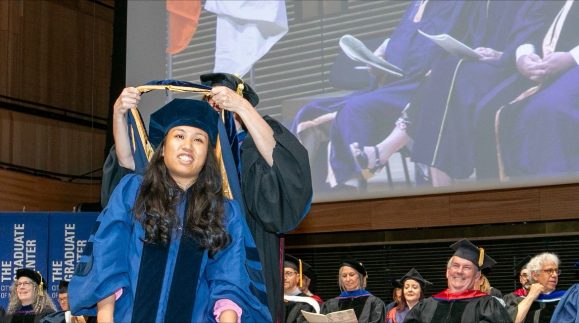By Jessica Desamero
Special to Campus News
“Why are you so quiet? Don’t you talk?” These were the comments I usually heard from my classmates during elementary school. I received straight As in my classes, but when it came to speaking and making friends, I had lots of trouble.
In high school and college, I managed to speak a little more and make a few friends, four of which I still speak with to this day. However, inside, I was still a shy girl with a lot of self-doubt. I knew I was passionate about science, but I didn’t know what I could do professionally, given my quiet nature.
This was when my dad recommended that I apply to Ph.D. programs. He received his Ph.D. in chemistry and was a college research professor, and he encouraged me to do the same. At first, I was a little hesitant. When I visited his lab and observed how he interacted with his student mentees, I would see how he has a loud voice, appears very confident in his expertise and has an overall commanding presence. “How could I ever be like that?” I would think to myself.
Still, I did love biochemistry and was particularly fascinated with the molecular origins of diseases. And I was excited by the thought of doing research to better understand diseases and develop more advanced treatments. I applied and got into the CUNY Graduate Center’s Biochemistry Ph.D. program in 2015.
The first year of the program consisted of taking classes and rotating at different research labs. We had several class presentations and groupwork exercises, but it wasn’t too bad. The real tests were after we chose our labs and started to conduct our doctoral research.
First, we had to teach one to two courses each semester. I hadn’t taught before, so my first class was especially nerve-wracking. Before the semester started, I shadowed a fellow professor to see how classes usually go. But nothing could prepare me for the anxiety of trying to be the main authority figure of the classroom, especially as someone who was an undergraduate student just a year and a half before.
The first semester was rough, but over time, I became used to teaching. Things became easier, and I eventually developed a louder, more authoritative (but still kind) persona that I switch to whenever I teach. In 2019, I even received a collective card from some of my students, thanking me for all my help and guidance through their lab experiments. I was especially touched and thought, “Wow, I really did it.” Challenge 1, complete.
The larger hurdle, however, was presenting my research. For an exam called the second level, we had to present a thesis proposal to see if we were qualified to progress as Ph.D. candidates. From the start, I was already doubting myself, as the imposter syndrome was always in the back of my mind. This lack of confidence really showed in my presentation. Because of my proposal-writing skills, I was able to pass the exam. However, in a year’s time, they wanted me to give them another presentation on my research progress, and if I didn’t improve by then, I would unfortunately have to leave the program.
Starting then, I was determined to do better. I wasn’t going to let my introversion hold me back anymore, so I started doing things out of my comfort zone. I gave mini talks to our lab’s undergraduates about various laboratory techniques and presented scientific posters at more research conferences. Then I started doing activities outside of research. What truly helped was volunteering in science outreach, where I practiced speaking and teaching science to children and parents. This boosted my confidence in my communication skills and in presenting myself as an expert. All these endeavors were especially hard at first but got easier over time as well. I still get nervous, but my nerves are more manageable now.
By the next presentation, I was much more confident, and it showed. My committee saw how much I improved from the last time that they even clapped. I proceeded to continue with my thesis research, knowing that I did have it in me.
Near the end, I even found myself pitching the idea to present at a general science communication event. I presented alternative DNA structures as anticancer superheroes, and I had fun doing so.
My thesis defense was the most anxiety-inducing experience of my graduate school years, but inside, I knew I could do it. And I did. I also didn’t hesitate with any questions, even those asked in the middle of my presentation. The deliberation took a much shorter time than before, and 15 minutes later, I was Dr. Jessica Desamero. I turned my biggest professional failure into one of my greatest achievements, and I couldn’t be prouder of myself.
At first, I never thought I would be a good public speaker. Now I’m a Ph.D. and practicing science communicator. I still get shy and anxious, especially at social events. And I do occasionally still have imposter syndrome. But now I know that I am good enough, and I can do anything I put my mind to.
After graduating, I taught at a different CUNY campus. In one class, one of my best students was shy and soft-spoken. One time, she apologized for speaking low, but I reassured her that it was okay and that she didn’t need to apologize. I also acknowledged that she was a good student. I didn’t get to give her advice back then, but if I did, here’s what I’d say to her and to others who are shy but want to pursue careers traditionally associated with extroverts:
1. Practice putting yourself out there and talking with others in different ways
It doesn’t have to be directly related to your professional career goal. Sometimes taking on something adjacent can be a more manageable start. It will be hard at first, but over time, it will get easier. You can even start by going to an event related to one of your personal interests.
2. Find your passion
When you’re passionate about something, it makes it easier to work towards achieving your goals. When you have passion, you are more determined to succeed despite facing challenges.
3. A positive mindset works wonders
Failed at trying to speak at an event? Don’t beat yourself up too much! You tried, which is still important! Also, when the imposter syndrome and self-doubt hit, make sure to remember that you are good enough and that you are enough.
 Jessica Desamero received her Ph.D. in biochemistry from the CUNY Graduate Center and is a science writer and educator.
Jessica Desamero received her Ph.D. in biochemistry from the CUNY Graduate Center and is a science writer and educator.







Facebook Comments